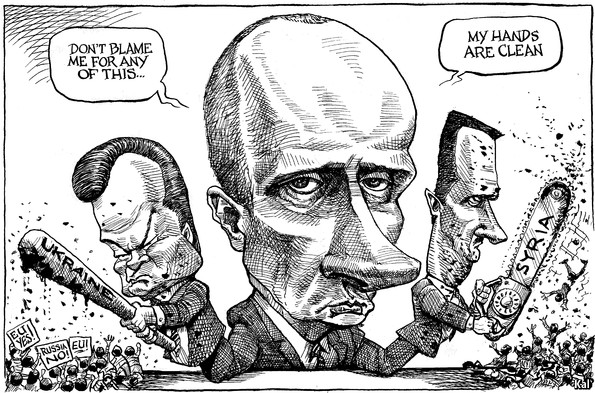
In June 2005, Vladimir Putin saw a diamond-studded Super Bowl ring on the finger of Robert Kraft, the owner of the New England Patriots. Kraft was in St Petersberg for a gathering of business leaders, and the ring was worth $25,000. Putin asked to see it, tried it on, and said: “I could kill someone with this.” Then, allegedly, he put it in his pocket, drew his security guards around him, and left the room.
What does this incident tell us about the psychology of the man who rules Russia? On the day that both government troops and Russian-backed rebels are supposed to begin withdrawing heavy weapons from the fron tline in eastern Ukraine as part of the Minsk agreement, this question is of special importance.
In democracies which have checks on leader’s power, psychology may not play a crucial role in statecraft. But Putin’s control over the Russian media, judicial system and business world means that his personal psychology plays a much more important role in state policies than is the case for other countries.
We don’t know exactly how much control Putin has over the rebels, but it is likely to be considerable, despite their protestations. Putin’s troops operate in Ukraine, and we know he believes himself to be the true leader of Russian-speakers in former Soviet satellites from Ukraine to Lithuania. Just read his speech to the Russia parliament on April 25, 2005:
“Above all, we should acknowledge that the collapse of the Soviet Union was a major geopolitical disaster of the century… Tens of millions of our co-citizens and compatriots found themselves outside Russian territory.”
Three months after the incident with Robert Kraft’s ring, while visiting the Guggenheim Museum in New York, Putin was shown a glass replica of a Kalashnikov gun filled with vodka. According to one biographer, Masha Gessen, Putin nodded to one of his guards, who, to the astonishment of all present, simply pocketed the piece.
Such incidents give us a first, important clue about his personality: Putin does not feel bound by the ordinary rules of civility. This, in turn, suggests that he may not be inclined to respect bigger rules – for instance those of the Minsk agreement.
To be fair, Putin almost certainly believes that the West has breached much bigger understandings with Russia regarding the integrity of the empire he formally served. The sight of NATO fighters patrolling Russian borders in what was formally Soviet territory is galling for him. Similarly, the flirting of former colonies such as Georgia and Ukraine with NATO membership is likely infuriating. From this distorted perspective, he feels justified in breaching more trivial rules of personal property in what he regards as a weak, decadent West.
A second key aspect of his personality is contempt. At a joint German-Russian cabinet meeting in Siberia in 2006, German Chancellor Angela Merkel chided Putin that he should treat his cabinet ministers with respect rather than contempt. Contempt is the emotion reserved for those we regard as inferiors, and it is likely that Putin regards the West – particularly Western Europe – as inferior in many ways, not least militarily.
Yet contempt is a very problematic emotion because it abolishes empathy. Empathy is the crucial ingredient of negotiation: compromises and trust arise when people begin to see things from the other point of view. But contempt negates the other perspective and the object of contempt is just that – an object. Objects do not have a point of view.
There is a third factor underlying Putin’s psychology: fear. A small, thin-skinned man who grew up in poverty in a Leningrad haunted by memories of starvation and death, he was personally witness to what was for him another catastrophe – the collapse of the Soviet Union.